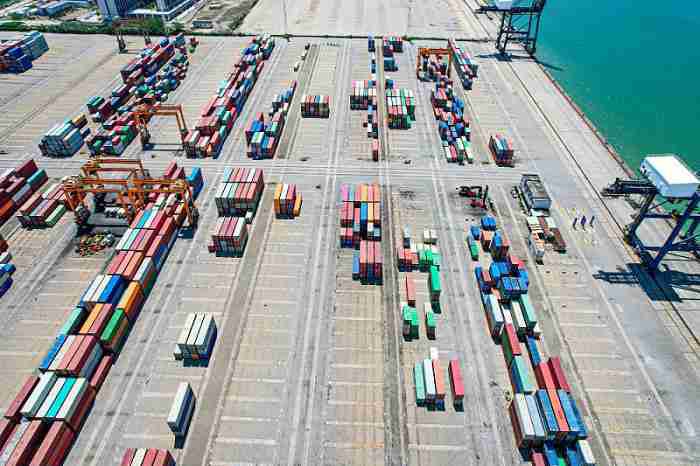
Ocean freight is essential to cross-border trade in the modern, globally integrated economy. It enables the transportation of goods across continents, connecting companies and customers globally. Additionally, due to Covid-19 limitations, there have been staffing shortages in the supply chain, including dockworkers, which has added to the logistics and supply chain backlog, including warehouses, depots, road transportation, and inland waterways.
Fuel consumption and carbon emissions rise when more time is spent at the anchorage and in traffic. According to experts, excessive fuel consumption totaling $18 billion annually and 160 million tons of carbon emissions result from early ship arrivals, poor planning, and port congestion.
The purpose of this blog post is to explore how port congestion impacts ocean freight and the challenges that ocean shipping lines and freight companies face as a result. We will also talk about tracking and quotes for ocean freight and the costs and shipping procedures from India.
Understanding Port Congestion
Conger occurs when there is a greater demand for containerized goods than the port can handle. The volume of trade has increased, the size of the vessels has grown, there have been labour disputes, there is insufficient infrastructure, and there are customs procedures. Ports consequently encounter delays, increased vessel waiting times, and decreased productivity.
Challenges for Ocean Shipping Lines due to Port Congestion
Ocean shipping lines are impacted by port congestion in a variety of ways. Delays and longer turnaround times throw off shipping plans, causing missed connections and financial losses. Fuel price increases, vessel downtime, and demurrage fees could affect shipping lines. Additionally, the absence of berths and terminal amenities may force vessel diversions, which adds to costs.
Impact on Ocean Freight Logistics due to Port Congestion
The efficient flow of goods is hampered by port congestion, which affects the entire ocean freight logistics chain. At busy ports, delays in loading and unloading cargo can cause stock shortages, supply chain disruptions, and higher storage costs. Customers' satisfaction and profitability may suffer if importers and exporters cannot meet production and delivery deadlines.
Ocean Freight Tracking and Quotes impact on Port Congestion
Shippers depend on sophisticated tracking systems that give them real-time visibility into their cargo to lessen the effects of congestion. With the help of ocean freight tracking, companies can track the status of their shipments, spot bottlenecks, and make wise choices. Additionally, getting precise ocean freight quotes enables shippers to budget their logistics costs wisely, considering potential delays and congestion-related costs.
Ocean Freight Shipping Companies impact on Port Congestion
Companies that handle ocean freight shipping are essential in managing port congestion issues. To streamline operations, these businesses deal with global trade challenges and collaborate closely with port authorities. Reducing delays brought on by congestion depends heavily on effective coordination, simplified documentation, and cooperation with freight forwarders and customs officials.
Impact of Port Congestion on Ocean Freight Rates
Ocean freight rates may fluctuate depending on port congestion. Shipping companies may need to modify their pricing to account for additional costs associated with disrupted supply chains. Shippers can use online platforms to compare ocean freight rates, allowing them to select the most economical shipping options while considering potential delays brought on by traffic.
Sea Freight Shipping from India
India faces particular difficulties in sea freight shipping as a major participant in world trade. Major Indian ports may become backed up, reducing export competitiveness and slowing overall economic growth.
Smooth sea freight shipping from India depends on streamlining port operations, improving infrastructure, and implementing efficient logistics management systems.
The Ripple Effect on Global Trade
Individual ports are impacted by port congestion, which also impacts international trade. When a major port is congested, it can lead to delays and disruptions affecting many countries and supply chains. Worldwide inventory shortages, price increases, and longer lead times could affect producers, retailers, and customers. This interconnectedness emphasizes how crucial it is to address port congestion on a global scale to maintain a smooth flow of goods and sustain economic growth.
Infrastructure Investment and Capacity Expansion
Infrastructure improvements and capacity growth are essential for reducing port congestion. Enhancing efficiency and accommodating rising trade volumes can be accomplished by constructing new terminals, upgrading port infrastructure, and modernizing transportation networks. Governments, port authorities, and private stakeholders should work together to identify bottlenecks and invest in infrastructure projects that increase port productivity and ease traffic.
Diversification and Multimodal Transportation
Using multimodal logistics solutions and varying modes of transportation can lessen port congestion. Utilizing inland terminals, alternative ports, and intermodal transportation networks can increase flexibility and route options while lowering reliance on clogged ports. Additionally, certain supply chain segments can completely avoid clogged ports and speed up cargo movement by using rail, road, or air transportation.
Conclusion
Port congestion has significant economic effects on ocean freight, affecting many facets of international trade. Congestion-related delays, disruptions, and higher costs can greatly impact supply chains, economies, and businesses. However, preventative measures like infrastructure investments, team-based approaches, and regulatory reforms can lessen the adverse effects of port congestion.
By placing emphasis on effectiveness, sustainability, and resilience in ocean freight logistics, we can promote a more stable and reliable global trading system.
FreightMango is a market-leading freight platform that combines sophisticated tracking technologies, affordable ocean freight quotes, and easy communication with shipping lines and freight firms. With our knowledge of controlling port congestion, we guarantee on-time delivery, reduce disruptions, and lessen the financial impact on your supply chain.





 Get instant quote
and compare offers in real time
Get instant quote
and compare offers in real time